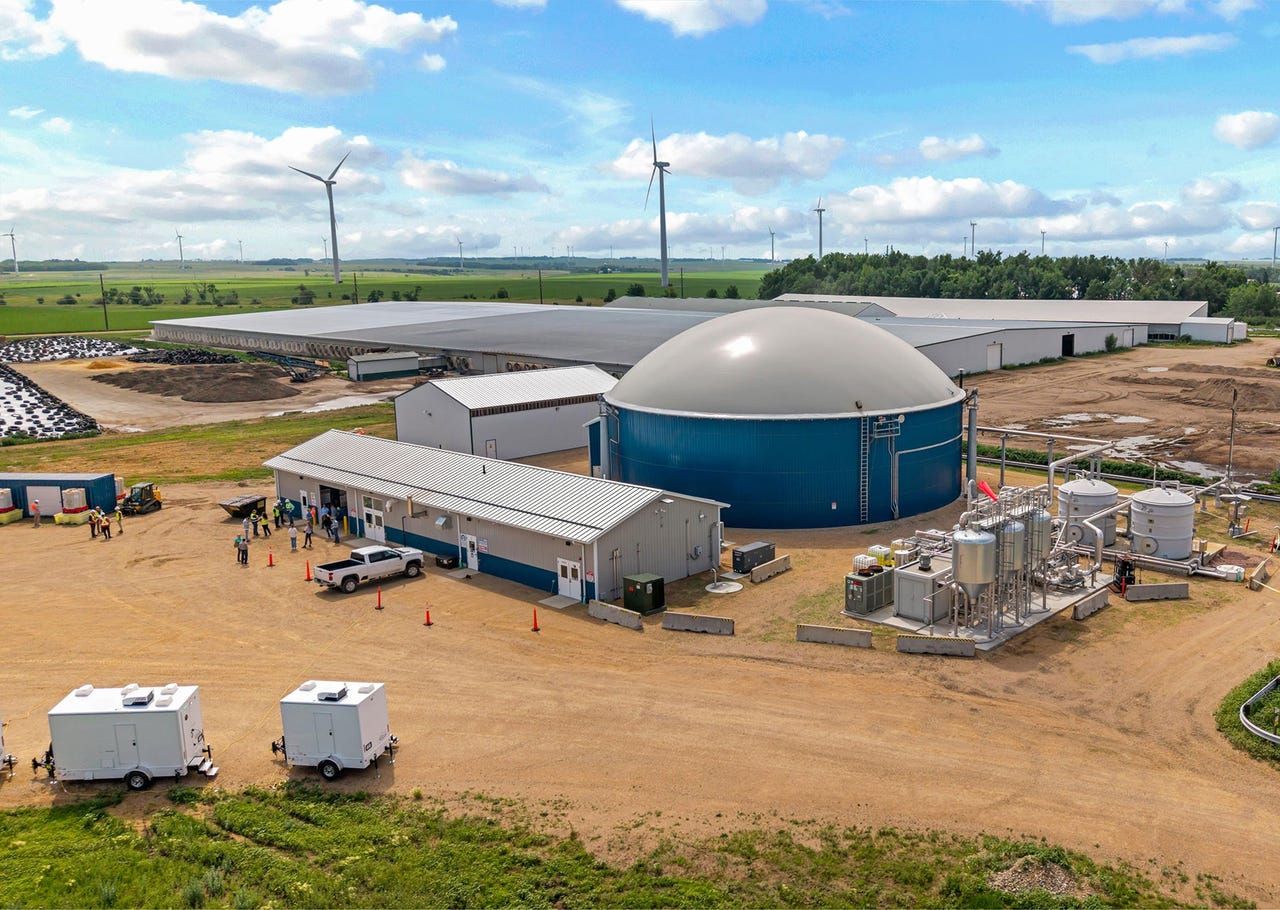Ash Grove Dairy, northwest of Lake Benton, Minn., is adding another revenue stream by turning manure produced by the 2,100-head Holstein cow herd into renewable natural gas via a methane digester that has been operational for about 18 months.
A joint venture between Clean Energy Fuels Corp. and bp called Renewco owns the digester facility, says Christie Ings, Clean Energy senior director of renewable natural gas engineering and compliance. “We are in partnership with the dairy, though, so there are royalties that are paid to the dairy for the renewable natural gas produced by the manure from Ash Grove’s dairy cows,” she says.
Ings remotely oversees six other such facilities located in South Dakota and Minnesota along the Interstate 29 corridor.
The digester at Ash Grove sits on the 55-acre farm site, just to the north of the cow barns, and “we supply manure to them every day, on a daily basis, and then we get a percentage of the gross revenue on the sales” of the RNG, says Michael Crinion, owner of Ash Grove Dairy.
Just as cows continually create manure, Ings says methane production is a continual process, as the cows’ manure is pumped into the digester from the farm’s lagoon. Ash Grove’s digester processes up to 60,000 gallons of manure each day, capturing and cleaning methane that is produced.
At that point, she says, the product is 55% methane “when it’s made naturally, and then we concentrate it to almost 100% and load it out onto the trucks and bring it to the interstate pipeline in Brookings,” which is about 20 minutes to the west. By this method, the methane is not released into the atmosphere as a greenhouse gas.

ENERGY CYCLE: A joint venture between Clean Energy Fuels Corp. and bp called Renewco owns the digester facility that sits mere yards from the Ash Grove Dairy cows. (Clean Energy Fuels Corp.)
From there, the RNG is sold into transportation markets such as California, or to companies such as Amazon or UPS that are seeking RNG in their vehicles and in their fleets to offset emissions, Ings says. “It could also be municipal based, such as a city that’s interested in offsetting their bus fleet’s emissions so they can fuel with renewable natural gas some portion of their fleet.”
Ings says Clean Energy’s core business is fueling fleets with RNG.
Improving carbon score
With talk of carbon scores, Crinion is eager to see how the addition of a methane digester improves the dairy farm’s score.
“We work with a co-op out of Wisconsin called Farmers for Sustainable Food, and they had a climate-smart grant, and they worked with us to help us calculate our [carbon intensity] score, and even before the digester, our CI score was 19% better than the industry average,” Crinion says. “That’s working with our crop farmers doing no-till, cover crops and good manure management. So, it’s been a win-win for everyone.”
Randy Gross, general manager of Ash Grove Dairy, credits Crinion with steering the farm’s “ship” in the right direction, “always looking to where the industry is going and how to be a part of where it’s going,” he says. “Whatever piece of the pie in agriculture you’re involved in, I think everybody is pointing that direction, so it’s important to be toward the front end of that movement.”
While Ash Grove Dairy is now involved in the renewable natural gas production chain, Gross still is mainly interested in and involved in ensuring the cows are as productive as possible. “We do what we do with the cows every day,” Gross says. “We make sure the manure gets to that thickening building so they have a good product going into the digester.”
After the methane has been scrubbed from the manure, the leftover organic matter is sold to area farmers for spreading on their cropland. Ash Grove Dairy concentrates on raising cows and leaves the growing of feedstuffs to neighboring producers.